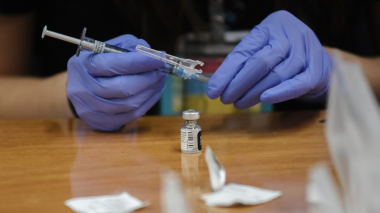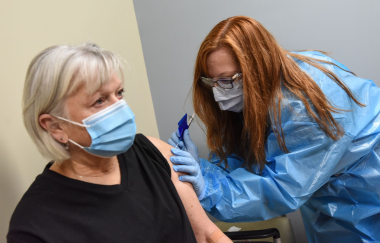Recent headlines have addressed a possible connection between the COVID-19 vaccine and heart inflammation – called myocarditis and pericarditis – in young people between 16 and 30 years of age. Here, three Atrium Health physicians share what myocarditis and pericarditis are, how they affect the body, and the safety of the COVID-19 vaccine. These physicians are Janelle White, MD, pediatrician at Atrium Health Levine Children’s University Pediatrics; Amina Ahmed, MD, pediatric infectious disease expert and epidemiologist at Atrium Health Levine Children’s; and Dermot Phelan, MD PhD, director of sports cardiology at Atrium Health Sanger Heart & Vascular Institute.
Their message is consistent: The risk of heart inflammation in young people who receive the COVID-19 vaccine is extremely small, and the known benefits of the vaccine far outweigh those risks. If a patient or parent is weighing a decision about vaccination with the goal of minimizing risk, this is crucial information to factor into that decision.
What are myocarditis and pericarditis?
Dr. Phelan: Myocarditis and pericarditis are both inflammatory processes that affect the heart. Pericarditis is inflammation of the pericardium, which is the lining of the heart. This usually presents with severe, sharp pain, which is typically worse lying flat and relieved by sitting forward. We treat this with anti- inflammatory medications and this usually, with a few exceptions, resolves quickly without long-term problems.
Myocarditis is more concerning. It refers to a process of inflammation of the heart muscle itself. While this is often mild and resolves on its own without long-term issues, myocarditis can increase the risk of abnormal and sometimes dangerous heart rhythms, and severe myocarditis can result in end-stage heart failure or even death.
What are the short-term and long-term health effects of heart inflammation?
Dr. White: Inflammation can damage the heart muscle cells, which may lead to thickening and swelling of the heart muscle and enlargement of the chambers of the heart. This can cause an enlarged heart, abnormal heart rhythm or heart failure. Damaged heart muscle cells may also impair the heart’s ability to pump blood to our vital organs.
Dr. Phelan: For athletes, we recommend a period of rest for all inflammation to resolve before returning to a high level of exercise.
Why are younger populations more at risk for heart inflammation from mRNA vaccines?
Dr. Ahmed: Most cases of myocarditis or pericarditis that follow mRNA COVID-19 vaccination have been observed in young adults who are between 16 and 30 years old. We know that myocarditis due to any cause occurs more frequently in young adults compared with older adults, but we do not know why this population is at higher risk for the disease, with or without vaccination.
Dr. White: In general, myocarditis is commonly caused by viruses that cause colds and gastrointestinal illnesses that are common in childhood.
What signs and symptoms should parents, teens and young adults be on the lookout for?
Dr. White: Be on the lookout for symptoms such as persistent chest pain, shortness of breath and the feeling of having a fast-beating, fluttering, or pounding heart. Patients may also feel flu-like symptoms, including fatigue, fever and muscle soreness.
What should you do if you or your child is experiencing these symptoms?
Dr. Ahmed: Parents and caregivers should contact their child’s primary care provider if the child is experiencing the symptoms described above. If a child is having heart palpitations or severe shortness of breath, the parents should call 911.
Dr. White: After seeking medical care, please report the symptoms to the Vaccine Adverse Event Reporting System.
If someone under 30 years of age hasn’t been vaccinated yet, should they still consider getting vaccinated?
Dr. White: Yes. The Centers for Disease Control and Prevention (CDC) continues to recommend COVID-19 vaccination for everyone 12 years of age and older. The known and potential benefits of COVID-19 vaccination outweigh the known and potential risks, including the possible risk of myocarditis or pericarditis.
Dr. Phelan: Absolutely. There have been reports of instances of mild, self-resolving myocarditis after the second mRNA vaccine, but these are very rare and the benefits of getting the vaccine in terms of significant reduction in risk of a major problem with COVID-19 appear to far outweigh the risks of developing mild myocarditis. The recommendations from the CDC, the American College of Cardiology and the American Heart Association emphasize that the benefits of the COVID-19 vaccine far outweigh the risks, and people should continue to get vaccinated.
Dr. Ahmed: Yes. After looking at all the information available on cases of myocarditis or pericarditis in young adults after COVID-19 vaccination, the benefits of getting vaccinated still outweigh the risk.
To schedule a COVID-19 vaccination for yourself or your child – or to learn more vaccine news and FAQs – please visit Atrium Health’s COVID-19 Vaccine page.



